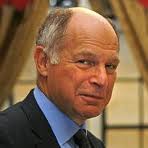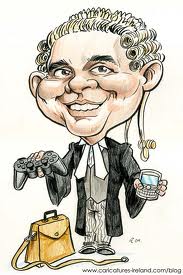Law and Rights
Media:
Monday 23rd May - The Guardian - Twitter row prompts call for superinjunctions debate in Parliament
Blogs:
- Court Of Protection .... Is For The Weak And Vulnerable Not The Rich And Famous
Over recent weeks, there has been massive coverage of the use of injunctions to protect the private lives of various "celebrities" - (who can afford to bring these cases to court). Then there has been the case in the European Court of Human Rights...
- Lord Neuberger - Speech To The Judicial Studies Board - "open Justice Unbound?"
Lord Neuberger MR The Master of the Rolls, Lord Neuberger of Abbotsbury, delivered the annual Judicial Studies Board lecture on 16th March - see the full text of the speech at "Open Justice Unbound?" The question mark in the title of the speech...
- Super Injunctions: Private Prosecutions: Domestic Violence And Contact With Child
Injunctions For those wealthy enough to be able to use the courts, a "Super-injunction" may be one way of trying to ensure that personal information is kept private. Strictly speaking, a super injunction even bans publication of the fact that it...
- Parliamentary Privilege And The Expenses Claims
In the post Money, Money, Money (below) the possibility of using parliamentary privilege as a defence to charges under the Theft Act 1968 s.17 was mentioned. [The CPS had referred to that possibility in their press release]. The concern is...
- Money, Money, Money ....
Money, money, money ?.. a lot of stories are linked to it. Here are the lyrics to the well-known ABBA song. They seem to fit some of the news items currently in the media. The Crown Prosecution Service has announced that 3 MPs and a Peer will be prosecuted...
Law and Rights
Lord Neuberger - Superinjunctions and other orders
 |
| Lord Neuberger MR |
Imagine a conversation between the man in the street ? (let?s call him Joe) ? and a lawyer ? (Silkysmooth). Joe asks why he cannot know the name of some prominent person (X) who, so it is alleged, has been having an extra-marital affair. Silkysmooth responds ? ?The simple answer is that an order of the High Court ? known to lawyers as an ?injunction? ? prevents publication of the name.? Joe then asks ? ?Why have they done this? Surely, there?s such a thing as free speech.? Silkysmooth - ?Because X has a right, under the European Convention on Human Rights Article 8, to respect for his private and family life, his home and his correspondence ? and, for that matter, you have the same right.? Joe replies ? ?Maybe, but nobody?s interested in me and I can?t afford to get one of those ... what did you call ?em ... injunctions! Anyway, what about free speech.? ?Ah yes, Article 10 of the European Convention, I did my Masters thesis at Oxford on that before coming up to London ....?
Joe, rightly suspecting a lengthy monologue by Silkysmooth, interrupts - ?Can an injunction stop MPs discussing something in Parliament?? ?No", replies Silkysmooth, ?there is something called Parliamentary privilege. It?s an old law going back to the 17th century or before and is aimed at protecting the ability of Parliament to debate freely. However, this privilege has its limits. For instance, it is unclear whether it fully covers some matters such as conversations between an MP and a constituent. Also, you could be in breach of an injunction by mentioning it to your MP if the injunction prevents discussion with third parties? ?Well, all this ought to be sorted out, Joe says, ?why isn?t it?? ?Because sometimes no case has come up to get a ruling?, replies Silkysmooth.
?My wife told me that the judges have too much power and should not be doing these things ? after all they are unelected?, said Joe. ?Well?, replies Silkysmooth - (deliberately ignoring Joe?s technical breach of the hearsay rule) ? ?It is the elected politicians in Parliament who have let the judges do this, by bringing in the Human Rights Act 1998. The judges are only protecting the rights of those before the courts and this is all they are doing when they issue a superinjunction.?
?I?ve heard of one those? Joe intervenes, ?are we allowed to know one has been issued and can my MP get to know it exists?? ?You are not allowed to know?, insists Silkysmooth ? ?but your MP may
be able get to know though he might not be allowed to discuss it in Parliament because of the sub judice rule.? ?What the hell is that ? seems a sort of Catch 22?, splutters Joe. ?It?s a rule, made by Parliament itself, to prevent interference by Parliament with actual cases before the courts? ?Of course?, continues Silkysmooth, ?if Parliament really wanted to discuss the matter there?s nothing the courts could do to stop them. Nice to have met you but got to dash now! I?m before Openjustice J in 20 minutes ? applying for a superinjunction ....?
be able get to know though he might not be allowed to discuss it in Parliament because of the sub judice rule.? ?What the hell is that ? seems a sort of Catch 22?, splutters Joe. ?It?s a rule, made by Parliament itself, to prevent interference by Parliament with actual cases before the courts? ?Of course?, continues Silkysmooth, ?if Parliament really wanted to discuss the matter there?s nothing the courts could do to stop them. Nice to have met you but got to dash now! I?m before Openjustice J in 20 minutes ? applying for a superinjunction ....?
?Hang on?, calls Joe. ?Why is it that only these sportspersons and celebs get this treatment?? Silkysmooth turns and calls over his shoulder ? ?You?ve answered your own question old boy. They?ve got the money and you don?t have it.? With that, the bewigged figure of Silkysmooth strode away.
Joes is left pondering. Open justice! It would be good to know all that is going on in those courts but I guess that those judges know what they are doing when they say we cannot know. Would also be good if everything said in Parliament could be reported freely but I guess there will be rules about that as well. Would I be in trouble if I mentioned that an MP had referred to an injunction? Must now get back to fitting this bathroom ? it is probably more important to someone than all this legal stuff.
 |
| Silkysmooth - Barrister at Law |
Injunctions, human rights, privacy, free speech, parliamentary privilege, superinjunctions, sub judice, open justice, reporting of proceedings in Parliament. All those are the ingredients in the present brouhaha over an order by the High Court preventing the naming of a certain person who must be nameless. The issues are discussed in considerable detail in a report prepared by the Master of the Rolls (Lord Neuberger) and a committee of lawyers. It is highly informative and a full reading is essential. The report adopts the term superinjunction, says it has been a rarity and will continue to be so and defines the term. A new term ?Interim Non-Disclosure Orders? also appears. On this occasion, I will leave it to others to do a more lawyerly analysis. However, the report, which essentially makes procedural recommendations, seems highly unlikely to satisfy the news-hungry media who are fascinated by the private activities of celebrities. After all, such stories do sell newspapers! Furthermore, the report is a long way from an attempt by an ?unelected, out of touch and shockingly arrogant? judiciary - (quote from the Daily Mail 21st May) - to gag Parliament. It is a well written and balanced report but does not get into the substantive question as to whether the courts have got the balance right between rights to privacy and freedom of speech. That question could not be answered by a committee report and cannot be avoided by Parliament for much longer.
----------- Miscellaneous:
Cases:
Ntuli vDonald [2010] EWCA Civ 1276
CTB v News Group Newspapers and Imogen Thomas [2011] EWHC 1232 (QB)- this is the case at the centre of this row. Note that one of the court's concerns was to protect the applicant against a possibility of blackmail - see para. 22 of Eady J's judgment.
----------- Miscellaneous:
Cases:
Ntuli vDonald [2010] EWCA Civ 1276
CTB v News Group Newspapers and Imogen Thomas [2011] EWHC 1232 (QB)- this is the case at the centre of this row. Note that one of the court's concerns was to protect the applicant against a possibility of blackmail - see para. 22 of Eady J's judgment.
Media:
Monday 23rd May - The Guardian - Twitter row prompts call for superinjunctions debate in Parliament
Blogs:
"Turns out there weren't that many super-injunctions after all" - UK Human Rights Blog 20th May
"Report of the Neuberger Committee: thorough, thoughtful but not the last word" - Inforrm's Blog
Earlier post - Injunctions and Privacy
Related topics - Court of Protection .... Commenting on Family cases
Charon QC - "Postcard from the Staterooms ******* edition"
Addendum 23rd May: The Attorney-General announced in the House of Commons that a Joint Committee of Both Houses is to be set up to consider whether changes are needed to the law of privacy injunctions. BBC News 23rd May.
Earlier post - Injunctions and Privacy
Related topics - Court of Protection .... Commenting on Family cases
Charon QC - "Postcard from the Staterooms ******* edition"
Addendum 23rd May: The Attorney-General announced in the House of Commons that a Joint Committee of Both Houses is to be set up to consider whether changes are needed to the law of privacy injunctions. BBC News 23rd May.
- Court Of Protection .... Is For The Weak And Vulnerable Not The Rich And Famous
Over recent weeks, there has been massive coverage of the use of injunctions to protect the private lives of various "celebrities" - (who can afford to bring these cases to court). Then there has been the case in the European Court of Human Rights...
- Lord Neuberger - Speech To The Judicial Studies Board - "open Justice Unbound?"
Lord Neuberger MR The Master of the Rolls, Lord Neuberger of Abbotsbury, delivered the annual Judicial Studies Board lecture on 16th March - see the full text of the speech at "Open Justice Unbound?" The question mark in the title of the speech...
- Super Injunctions: Private Prosecutions: Domestic Violence And Contact With Child
Injunctions For those wealthy enough to be able to use the courts, a "Super-injunction" may be one way of trying to ensure that personal information is kept private. Strictly speaking, a super injunction even bans publication of the fact that it...
- Parliamentary Privilege And The Expenses Claims
In the post Money, Money, Money (below) the possibility of using parliamentary privilege as a defence to charges under the Theft Act 1968 s.17 was mentioned. [The CPS had referred to that possibility in their press release]. The concern is...
- Money, Money, Money ....
Money, money, money ?.. a lot of stories are linked to it. Here are the lyrics to the well-known ABBA song. They seem to fit some of the news items currently in the media. The Crown Prosecution Service has announced that 3 MPs and a Peer will be prosecuted...
